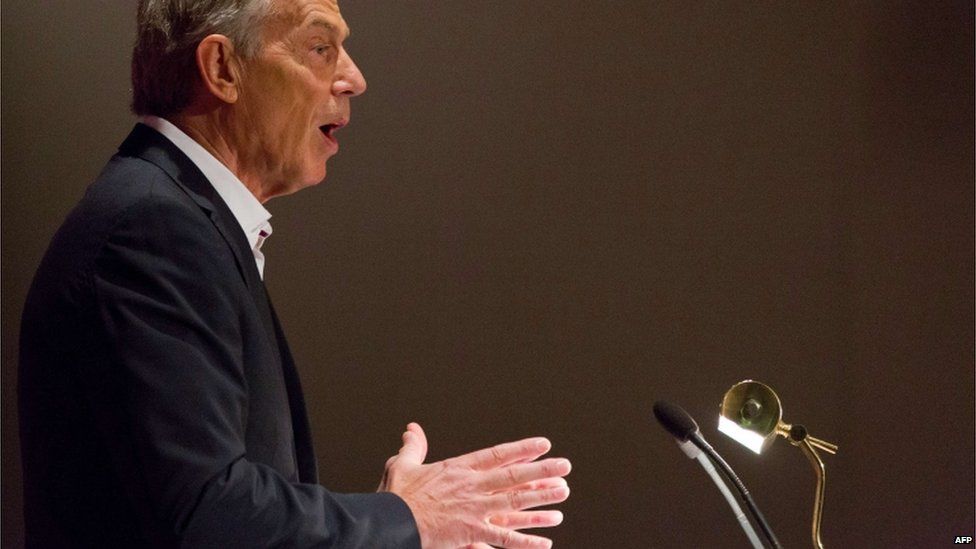Reject 'Alice in Wonderland' politics, Blair tells Labour
- Published

Tony Blair has told Labour party members to come to their senses and reject the "Alice in Wonderland" politics of Jeremy Corbyn.
Writing in the Observer, the former Labour prime minister accuses those backing Mr Corbyn for party leader of being in a "parallel reality".
He says he understands what is stoking "Corbynmania" but a win for the left-winger would spell electoral disaster.
Liz Kendall, Andy Burnham and Yvette Cooper are also seeking the leadership.
Recent polls suggest Mr Corbyn, MP for Islington North, is the favourite to succeed Ed Miliband.
Mr Blair has made previous appeals to party members to steer clear of Mr Corbyn.
He says he accepts that, together with fellow Labour veterans Neil Kinnock and Gordon Brown, his warnings have fallen on deaf ears and seem to have made people more likely to back Mr Corbyn.
In his article, Mr Blair compares the surge in support for Mr Corbyn to a suicidal rush towards a cliff edge.
"It is like a driver coming to a roadblock on a road they've never travelled before and three grizzled old veterans say, 'Don't go any further, we have been up and down this road many times and we're warning you that there are falling rocks, mudslides, dangerous hairpin bends and then a sheer drop'; and the driver says, 'Screw you, stop patronising me. I know what I'm doing'."
He acknowledged that his comments made "enthusiastic young supporters" more likely to support Mr Corbyn.
Earlier this month, Mr Blair said Labour risked "annihilation" if Mr Corbyn won the contest, saying it was walking "over the cliff's edge".
Mr Burnham, who served in Tony Blair's government, warned against ignoring his advice.
Andy Burnham: "People are fed up with the way politics is"
"Tony Blair won three general elections for Labour. If we've got to a point now where the Labour party says it doesn't want to listen to him, well, I would think we've lost the plot.
"We've got to listen to people who've been there in the past and seen Labour when it had difficulties in times gone by. But at the same time, look at the circumstances we're in now, not live in the past."
Mr Corbyn has brushed off criticism from his rivals, saying he is "not really very bothered" by what others had to say about his campaign.
Ms Cooper, Ms Kendall and Mr Burnham have all attacked his plans, saying they are not credible and will make the party unelectable.
Recent polls of Labour supporters have suggested that Mr Corbyn is the clear frontrunner in the race for the Labour leadership.
However, a Newsnight/Ipsos Mori focus group of former Labour voters found most preferred Ms Cooper, with Mr Corbyn the least preferred.
"He's got all the policies straight out of the sixties"
The focus group participants described Mr Burnham as "quite credible". On Ms Kendall, they said she needs more "passion" and "personality".
Meanwhile, Mr Burnham set out proposals to fine companies who failed to pay a proposed new higher living wage of £11 per hour, if he won power.
Ballot papers for the Labour leadership vote were sent out to party members, registered supporters and affiliated supporters on 14 August and must be returned by 10 September.
The result is due on 12 September.
Labour leadership contest
- Who are the candidates? Andy Burnham, Yvette Cooper, Jeremy Corbyn, Liz Kendall
- Dates: Ballot papers will be sent out on Friday; voting can take place by post or online. They must be returned by 10 September. The result is announced on 12 September
- Who can vote? All party members, registered supporters and affiliated supporters - including those joining via a union
- What is the voting system? The Alternative Vote system is being used so voters are asked to rank candidates in order of preference
- How does it work? If no candidate gets 50% of all votes cast, the candidate in fourth place is eliminated. Their second preference votes are then redistributed among the remaining three. If there is still no winner, the third place candidate is eliminated with their second preferences (or third in the case of votes transferred from the fourth place candidates) redistributed. It is then a head-to-head between the last two candidates
- Published30 August 2015
- Published28 August 2015
- Published26 August 2015
- Published20 August 2015
- Published12 September 2015
- Published14 August 2015
- Published13 August 2015